The Intrathecal Pumps Market is estimated to be valued at USD 269.5 million in 2025 and is projected to reach USD 447.4 million by 2035, registering a compound annual growth rate (CAGR) of 5.2% over the forecast period.
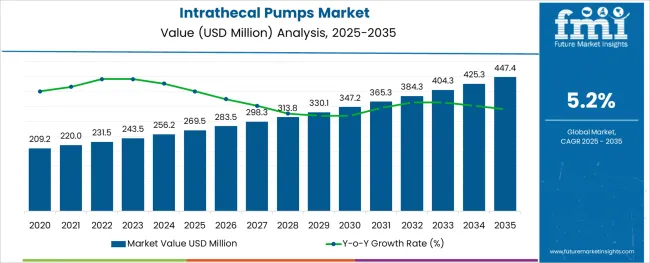
The alginic acid market is undergoing consistent growth, propelled by rising demand from food processing, pharmaceutical formulations, and cosmetic applications. A growing focus on natural and sustainable ingredients in manufacturing processes has positioned alginic acid as a preferred biopolymer across industries.
The market is further supported by its diverse functional benefits, including water retention, gelling, and stabilizing properties, which make it indispensable in high-performance formulations. Increased regulatory acceptance of alginates as safe additives and the push towards cleaner labeling in food and personal care products have reinforced their adoption.
Ongoing innovation in extraction technologies and the utilization of algae as a renewable resource are paving the way for cost-effective production and expanded applications, ensuring sustained market expansion in the coming years.
The market is segmented by Type and Application and region. By Type, the market is divided into Baclofen, Bupivacaine, Clonidine, Morphine, Ziconotide, and Other Types. In terms of Application, the market is classified into Spasticity and Pain. Regionally, the market is classified into North America, Latin America, Western Europe, Eastern Europe, Balkan & Baltic Countries, Russia & Belarus, Central Asia, East Asia, South Asia & Pacific, and the Middle East & Africa.
When segmented by salts, sodium alginate is expected to command 27.5% of the market revenue in 2025, marking it as the leading subsegment in this category. This leadership has been driven by its superior solubility, ease of incorporation into formulations, and versatility in a wide range of applications.
Its ability to form stable gels and maintain viscosity under varying conditions has made it highly sought after in both food and pharmaceutical sectors. Manufacturers have prioritized sodium alginate due to its consistent performance, cost-effectiveness, and regulatory acceptance, which have collectively strengthened its position.
The segment’s prominence has also been enhanced by its adaptability to evolving consumer preferences for plant-derived and sustainable ingredients, reinforcing its market share.
Segmented by end user industry, the food industry is projected to hold 33.0% of the market revenue in 2025, positioning it as the most prominent sector. This dominance has been shaped by the industry’s increasing reliance on alginic acid and its derivatives to deliver desirable textures, stabilize emulsions, and improve shelf life of processed foods.
As consumer demand for clean label and natural additives has intensified, the food sector has responded by integrating alginates into bakery, dairy, and confectionery products. Enhanced production efficiency and compliance with food safety standards have further encouraged widespread use.
The segment’s leadership has also been supported by product differentiation strategies where alginates contribute to premium quality and innovation, securing their role in modern food formulations.
When analyzed by functionality, thickening agents are forecast to account for 29.0% of the market revenue in 2025, establishing themselves as the dominant functional category. This preeminence has been underpinned by the growing need for consistent texture and viscosity in a wide array of end products.
Alginic acid’s natural origin and high efficiency in creating uniform, stable thickness without altering taste or color have solidified its appeal. The demand for thickeners in both edible and topical applications has expanded, with manufacturers leveraging its rheological properties to meet performance and regulatory requirements.
The functionality’s leading share has also been reinforced by the ability to deliver cost savings through lower dosages and its compatibility with other ingredients, securing its position as an indispensable component in formulation strategies.
The global market for the Intrathecal Pumps Market expanded at a CAGR of 4.2% from 2020 to 2024. The National Cancer Institute estimates that 442.4 new instances of cancer are diagnosed annually for every 100 thousand men and women.
Since intrathecal pumps work directly in the CSF and enable pharmaceuticals to be absorbed more quickly and directly than oral treatments, they are more advantageous than oral medications. This has accelerated the global market for intrathecal pumps.
The United States will continue to be the largest consumer of the Intrathecal Pumps, throughout the analysis period accounting for over USD 51.7 million absolute dollar opportunity in the coming 10-year period.
Pain is a prevalent and clinically significant illness in the aging population. However, the use of intrathecal pumps has led to better results in the treatment of senior patients with pain. Unfortunately, evaluating pain in geriatric patients is problematic, mostly due to the complexity of multiple comorbidities. The demand for intrathecal pumps will continue to rise as the number of the elderly population grows. The WHO projects that by 2050, there will be 2 billion individuals worldwide who are 60 years of age or older.
The capacity of a pump to deliver medications where they are most frequently required, as well as their increased potency, reduced systemic exposure, and the amount necessary to have the desired pharmacologic effect, is anticipated to drive market expansion. For instance, Flowonix Medicals produced a 40 mL pump for injecting medications into the intrathecal region. The delivery device uses a pressure-driven, valve-gated delivery mechanism and has a battery life of more than 10 years, which can help prevent the need for future surgical procedures.
In comparison to the conservative pain management procedure for our initial implantation cycle, IDD therapy is less expensive. The following costs are cumulative USD 17,317 greater than those for the conservative pain management procedure in the month of IDD implantation, although IDD breaks even financially shortly after the second year post-implant. According to the lifetime analysis, IDD saves USD 3,111 per patient annually compared to conservative pain management.
The desire for affordable treatments like intrathecal pumps has increased in response to growing global concern over how to reduce rising healthcare costs. A patient satisfaction survey on intrathecal pumps conducted in 2024 found that 76.9% of respondents had avoided the hospital after receiving an intrathecal implant, which significantly reduced the expenditures associated with healthcare consumption.
The use of all intrathecal pumps has not yet been approved by the American Food and Drug Administration. The FDA has warned medical professionals and patients about the harmful repercussions of using medications that have not received FDA approval. Drugs that are approved for intrathecal use must also adhere to more stringent safety standards.
The market expansion could be hampered by hazards such as dosing errors, infections, pump failure, opioid withdrawal, and other conditions like muscular spasms, cognitive problems, discomfort, fever, vomiting, weakness, and heart or respiratory distress. CSF leak, surgical site infection, and catheter site irritation are examples of surgical complications. Between 0.5% and 2.0% of intrathecal implants result in surgical infections.
Additionally, it is projected that the global lack of anesthesiologists and neurosurgeons will have a negative effect on market growth. Intrathecal pumps are superior to conventional drug delivery methods in a number of ways, but their application is constrained by related technical and surgical issues. The technological issues include pump failure and catheter kinks, disconnections, and obstructions (battery depletion, pump inversion, & pump erosion). Although none of these mechanical faults provide a life-threatening risk, they all need specialized modification.
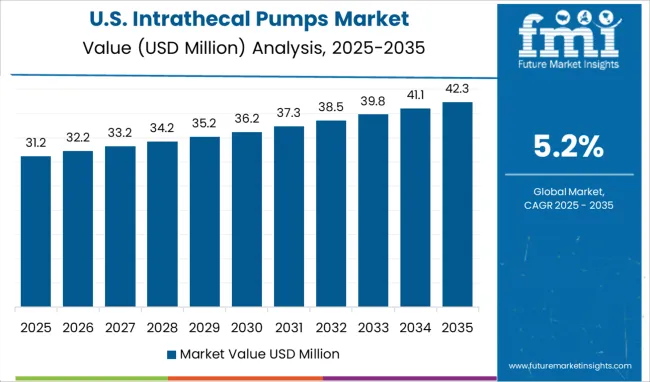
North America dominated the global intrathecal pumps market and accounted for a revenue share of over 40% in 2024. Growth in the market is anticipated to be fueled by the rising frequency of cancer and other related disorders, such as persistent back and neck pain. For instance, the Centers for Disease Control and Prevention (CDC) estimates that around 50 million Americans suffer from chronic pain.
Additionally, improving patient outcomes and safety is of the utmost significance. Several programs have been formed to do this in the United States. Another element influencing its expansion is the fact that North America spends significantly more on healthcare than any other region.
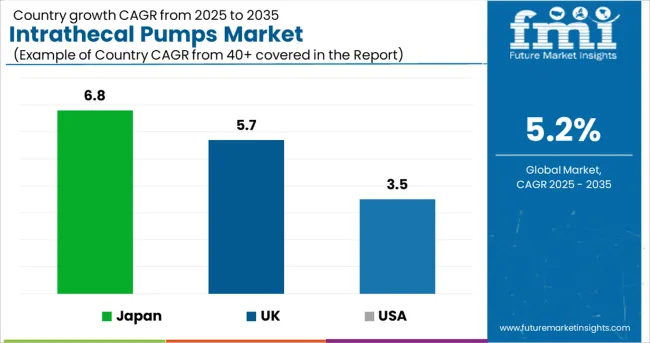
The United States will account for over 447.4 million of the global Intrathecal Pumps Market by the year 2035. The market growth from 2020 to 2024 was estimated at 3.5% CAGR. A malignant tumor of the brain or spinal cord affected over 24 thousand people in the United States in 2024, according to a report by the American Cancer Society.
The International Agency for Research on Cancer (IARC of WHO) recently released a report stating that there are now significantly more cancer patients. According to estimates, there are approximately 14.1 million cancer patients. Also, it was calculated that 8.2 million people will die from cancer each year. Future market growth is anticipated due to the rising incidence of cancer.
The market for intrathecal pumps in the United Kingdom. stood at USD 256.2 million in 2024. By 2035, the market in the country is projected to reach a valuation of USD 269.5 million, growing at a CAGR of 5.7% from 2025 to 2035. The market is expected to witness an absolute dollar opportunity of USD 8.4 million during the forecast period.
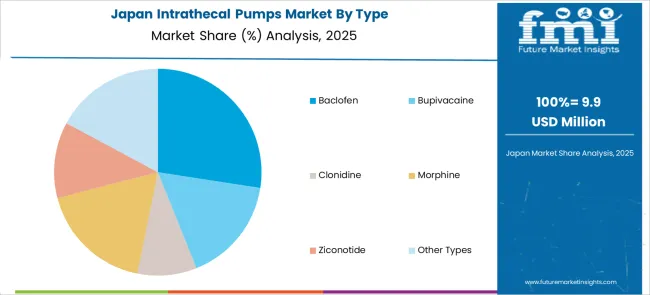
In Japan, the market for intrathecal pumps accounted for USD 9.4 million in 2024. From 2025 to 2035, the market accounted for an absolute dollar opportunity of USD 9 million, growing at a CAGR of 6.8%. The market in the country is expected to reach a valuation of USD 447.4 million by 2035.
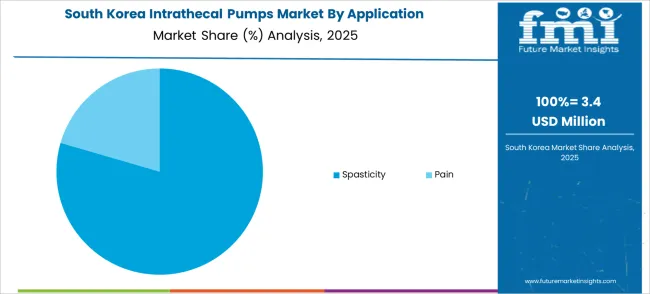
The intrathecal pumps market in South Korea accounted for a valuation of USD 4.8 million in 2024. By 2035, the market is expected to reach a valuation of USD 8.3 million. Growing at a CAGR of 5.2%, the market is projected to garner an absolute dollar opportunity of USD 3.3 million.
The market for morphine intrathecal pumps is projected to grow at a CAGR of 4.8% from 2024 to 2035. One of the most efficient treatments for severe chronic pain, intrathecal morphine injection is typically used as a part of a long-term therapy plan. Since morphine opioids are used 90% of the time in clinical settings, which is considered to be the gold standard for the management of postoperative pain, it is anticipated that this will drive segment growth.
The market through pain application held the largest revenue share of more than 70% in 2024. The segment is estimated to grow at a CAGR of 4.9% from 2024 to 2035. Many chronic diseases, including cancer, include pain as a component, and chronic pain is emerging as a distinct health issue with serious consequences for individuals.
Around 1.5 billion people worldwide suffer from chronic pain, and its incidence rises with age, according to the School of Public Health at Boston University. About 50 million people in the United States suffer from chronic pain, with 20 million of those suffering from high-impact chronic pain, according to the Centers for Disease Control and Prevention (CDC).
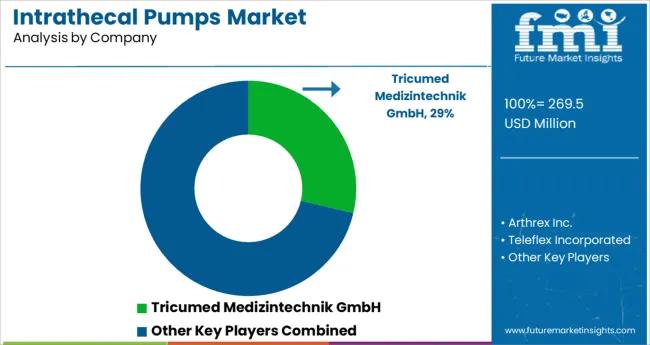
Some of the key companies operating in the Intrathecal Pumps Market include Medtronic, Smiths Medical, Flowonix Medical Inc., triumphed Medizintechnik GmbH, Teleflex Incorporated, Johnson and Johnson Services, Inc., Durect Corporation, Medallion Therapeutics, Inc., Abbott, Baxter International Inc., Codman & Shurtleff, Inc., DePay Synthes, Summit Medical Group, B Braun Melsungen AG, Becton, Dickinson & Company and Fresenius Medical Care AG & Co. KGaA., and Zimmer Biomet.
Some of the recent developments by key providers of the Intrathecal Pumps Market are as follows:
Similarly, recent developments related to companies manufacturing Intrathecal Pumps have been tracked by the team at Future Market Insights, which is available in the full report.
The global intrathecal pumps market is estimated to be valued at USD 269.5 million in 2025.
It is projected to reach USD 447.4 million by 2035.
The market is expected to grow at a 5.2% CAGR between 2025 and 2035.
The key product types are baclofen, bupivacaine, clonidine, morphine, ziconotide and other types.
spasticity segment is expected to dominate with a 54.3% industry share in 2025.






Our Research Products

The "Full Research Suite" delivers actionable market intel, deep dives on markets or technologies, so clients act faster, cut risk, and unlock growth.

The Leaderboard benchmarks and ranks top vendors, classifying them as Established Leaders, Leading Challengers, or Disruptors & Challengers.

Locates where complements amplify value and substitutes erode it, forecasting net impact by horizon

We deliver granular, decision-grade intel: market sizing, 5-year forecasts, pricing, adoption, usage, revenue, and operational KPIs—plus competitor tracking, regulation, and value chains—across 60 countries broadly.

Spot the shifts before they hit your P&L. We track inflection points, adoption curves, pricing moves, and ecosystem plays to show where demand is heading, why it is changing, and what to do next across high-growth markets and disruptive tech

Real-time reads of user behavior. We track shifting priorities, perceptions of today’s and next-gen services, and provider experience, then pace how fast tech moves from trial to adoption, blending buyer, consumer, and channel inputs with social signals (#WhySwitch, #UX).

Partner with our analyst team to build a custom report designed around your business priorities. From analysing market trends to assessing competitors or crafting bespoke datasets, we tailor insights to your needs.
Supplier Intelligence
Discovery & Profiling
Capacity & Footprint
Performance & Risk
Compliance & Governance
Commercial Readiness
Who Supplies Whom
Scorecards & Shortlists
Playbooks & Docs
Category Intelligence
Definition & Scope
Demand & Use Cases
Cost Drivers
Market Structure
Supply Chain Map
Trade & Policy
Operating Norms
Deliverables
Buyer Intelligence
Account Basics
Spend & Scope
Procurement Model
Vendor Requirements
Terms & Policies
Entry Strategy
Pain Points & Triggers
Outputs
Pricing Analysis
Benchmarks
Trends
Should-Cost
Indexation
Landed Cost
Commercial Terms
Deliverables
Brand Analysis
Positioning & Value Prop
Share & Presence
Customer Evidence
Go-to-Market
Digital & Reputation
Compliance & Trust
KPIs & Gaps
Outputs
Full Research Suite comprises of:
Market outlook & trends analysis
Interviews & case studies
Strategic recommendations
Vendor profiles & capabilities analysis
5-year forecasts
8 regions and 60+ country-level data splits
Market segment data splits
12 months of continuous data updates
DELIVERED AS:
PDF EXCEL ONLINE
Pumps Market Size and Share Forecast Outlook 2025 to 2035
Pumps and Trigger Spray Market Trends - Growth & Forecast 2025 to 2035
Mud Pumps Market Growth - Trends & Forecast 2025 to 2035
Lobe Pumps Market
Solar Pumps Market Analysis - Size, Share, and Forecast Outlook 2025 to 2035
Charge Pumps Market Size and Share Forecast Outlook 2025 to 2035
Spinal Pumps Market Size and Share Forecast Outlook 2025 to 2035
Facial Pumps Market Growth – Demand & Forecast 2025 to 2035
Insulin Pumps Market Size and Share Forecast Outlook 2025 to 2035
Airless Pumps Market Analysis - Size, Demand & Forecast 2025 to 2035
Competitive Overview of Airless Pumps Market Share
Jetting Pumps Market
Infusion Pumps Market Size and Share Forecast Outlook 2025 to 2035
Hydronic Pumps Market Size and Share Forecast Outlook 2025 to 2035
Aircraft Pumps Market Size and Share Forecast Outlook 2025 to 2035
Aquarium Pumps & Filters Market Demand 2024 to 2034
Smart IoT Pumps Market Analysis - Size, Share, and Forecast Outlook (2025 to 2035)
Sea Water Pumps Market Growth - Trends & Forecast 2025 to 2035
Diaphragm Pumps Market Growth - Trends & Forecast 2025 to 2035
Treatment Pumps Market Insights Growth & Demand Forecast 2025 to 2035

Thank you!
You will receive an email from our Business Development Manager. Please be sure to check your SPAM/JUNK folder too.
Chat With
MaRIA